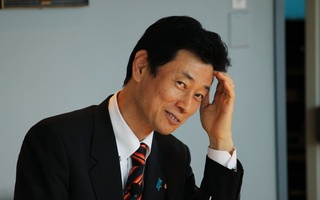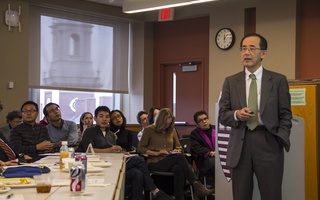UPDATED: November 9, 2014, at 2:00 p.m.
The Harvard College Japan Initiative hosted a dinner with visiting professor of Japanese studies Christine R. Yano in Cabot House Living Room Monday. The group of roughly 20 students discussed Asian American identity and the racially charged death threat emailed to some Harvard affiliates last weekend, among other topics.
Although Asian American identity was the main topic of discussion at the HCJI dinner, the conversation often drifted to different topics, including Hello Kitty.
“I’m getting a lot of interview requests; I feel like I’m in a bifurcated existence,” said Yano, who teaches Anthropology 1606: “Being Asian American: Representation and Realities.”
“I’m talking about Hello Kitty and the very serious issue with the email. I’m afraid at some point I’m going to mix them up,” she added, to laughter.
When the group discussed the death threat emailed to many Asian Americans at Harvard over the weekend, some dinner attendees suggested that the Asian American community was quieter than it should have been following the threat.
“The typical minority reaction is to shut up,” Yano said. “African Americans have been pushed into speaking out, and they’re leading the way, but it’s not easy, it’s easier to shut up.”
Nga H. H. Nguy ’16, one of the event organizers, said the Asian community might not “respond as aggressively.”
“We have been overlooked for a long time—if something happens to Asians it’s just ‘meh,’” she said. “[It’s] racism by omission.”
To amplify the Asian American voice at Harvard, Yano said that she plans on creating a book of student stories about “being Asian at Harvard.”
“I’ve discovered such a hunger for talking about being Asian American,” she said. “If you care about this kind of community, let your voices be heard.”
The discussion took on a lighter tone with a prolonged, semi-philosophical conversation on Hello Kitty. Yano said she discovered that Hello Kitty is a little girl, not a cat as some believe, while organizing and exhibition.
“It’s like in art; does it matter what the artist thinks?” said Bran S. Shim ’15, another organizer. “They say it’s not a cat. It is.”
The event was the first of a series of dinners featuring professors from fields related to Japan.
“[It’s] less mochi and sushi parties and more about conversation, more substantial, digging into issues,” said Stéphane E. Fouché '15, another organizer.
HCJI works with the Reischauer Institute of Japanese Studies and holds summer school for students in Japan. According to Fouché, the organization aims to create a “bridge between Japan and universities abroad.”
This article has been revised to reflect the following corrections:
CORRECTION: November 7, 2014
An earlier version of this article incorrectly misquoted Bran S. Shim ’15, talking about Hello Kitty. The quotation has been corrected.
CORRECTION: November 9, 2014
An earlier version of this article also incorrectly stated the context in which Yano learned that Hello Kitty is a girl, not a cat. In fact, she learned of the difference while organizing an exhibition.
Read more in College News
Investigation Unresolved, Yet Another Email Hits InboxesRecommended Articles
-
 Maurice M. Pechet Remembered as Pre-Med Mentor and Lowell Enthusiast
Maurice M. Pechet Remembered as Pre-Med Mentor and Lowell Enthusiast -
Japanese Ambassador Stresses Importance of CommunicationAmbassador Extraordinary and Plenipotentiary of Japan to the U.S.A. Ichiro Fujisaki cited effective communication as a top priority in an interview with The Crimson Tuesday.
-
Dukakis Predicts Obama Win, Breaks Down Election IssuesMichael S. Dukakis predicted a win for President Obama next week and broke down key issues at stake in the upcoming election in a talk on Thursday.
-
Postdoc Delivers Talk on JapanTimothy M. Yang, a postdoctoral fellow in Harvard’s Program on U.S.-Japan Relations, examined the influence of private drug companies on the Japanese colonial sphere during the interwar period in a talk on Tuesday afternoon at the Center for Government and International Studies.
-
 Senior Vice-Minister Discusses Japan's Economy at Harvard Kennedy School
Senior Vice-Minister Discusses Japan's Economy at Harvard Kennedy School -
 Former Bank of Japan Gov. Dispels Myths About Japanese Economy
Former Bank of Japan Gov. Dispels Myths About Japanese Economy













